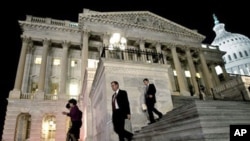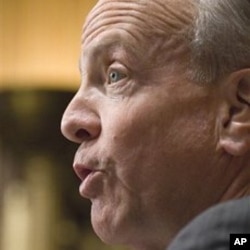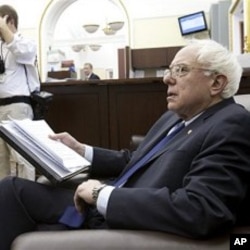Freshman Senator Jerry Moran of Kansas belongs to the Tea Party movement, which professes an almost single-minded determination to scale back the size, scope and cost of the federal government. Last week, Moran gave his first speech on the Senate floor.
Tea Party and budget
"Our government borrows 40 cents of every dollar it spends, and half our national debt is held by foreigners - many who do not share our interests," he said. "Common sense tells us this pattern cannot continue. Some will say we need to raise taxes to get us out of this mess. But the reality is: we do not have a revenue problem, we have a spending problem. Experience shows us that money raised by Washington results in more spending in Washington. It is time for our government to change direction and change dramatically."
Democrats reject budget cuts
At the other end of the ideological spectrum is Democratic Socialist Senator Bernie Sanders of Vermont, who rejects budget cuts in social welfare programs and education.
"We do have to address the deficit crisis. But we have to address it in a way that is fair and responsible," said Sanders. "The real tax rate for the richest people in this country is the lowest on record. So I ask my Republican friends: why do you want to balance the budget on the backs of low-income children, low-income senior citizens, those that are sick, those that are vulnerable without asking the wealthiest people in this country, who have never had it so good, to put one penny, one penny into deficit reduction?"
Fundamental division
The budget standoff is exposing a fundamental philosophical divide in America, a direct conflict of bedrock beliefs, according to analyst Matthew Dallek of the Bipartisan Policy Center.
"The budget debate has taken the core ideological divisions between the parties and very much brought them to the surface," said Dallek.
Left-of-center Democrats see the federal government as a necessary promoter of economic progress and the common good. Right-leaning Republicans see the government as a burdensome impediment to private enterprise. Many legislators sought office for the express purpose of advancing their particular vision of government. Dallek says sacrificing that vision in budget negotiations is no easy task.
"It is hard to imagine Democrats signing on to any comprehensive budget agreement that does not include some kind of tax increase," added Dallek. "It is also hard for Republicans, given the intensity of their anti-government, anti-tax rhetoric, to imagine them signing on to a deal with significant tax increases."
What do people want?
Complicating matters is the fact that no one likes to see their taxes raised or their government services cut, according to analyst John Fortier of the American Enterprise Institute.
"All of this is some sort of bad medicine," he said. "Higher taxes or lower spending is not something people would favor in the abstract. They would like to have their cake and eat it, too [enjoy benefits without cost]."
Recognizing that neither political party wants to be seen as losing the budget debate, and that neither spending cuts nor tax increases alone will solve America’s mammoth fiscal woes, some are suggesting a combination of both remedies. Former Senator Pete Domenici is a co-chair of a bipartisan budget commission that issued a sweeping reform plan last year. Domenici testified on Capitol Hill this week.
Dispute over taxes
But Democrats are refusing to consider deep cuts in domestic spending and Republicans dismiss all talk of raising taxes on any segment of the population. With both sides clinging to hardened ideological positions, negotiations have yet to yield a budget for the remainder of the current fiscal year, much less next year or into the future.
Analyst John Fortier sees the budget debate as a test of America’s democratic process, and its ability to respond to a grave and looming threat.
"It is a test, and the test is difficult because, yes, today the [deficit] numbers are bad, and we can see that we are in a different place fiscally than we ever have been," said Fortier."But it is the future that we are looking at that really is bleak. The commitments we have made 25-30 years down the line are very significant. We do not have the match between what we plan to spend and what we are going to raise [in revenues]."
Budget negotiations have focused on domestic non-security spending, which accounts for less than 15-percent of the federal outlays. Left untouched is the U.S. defense budget - the world’s largest - and programs that provide income and health care to retirees. Without reform, so-called entitlement programs are projected to add trillions of dollars to America’s national debt in coming decades, wiping out any savings in other parts of the budget or additional revenues that might be collected if and when a budget deal is reached.







